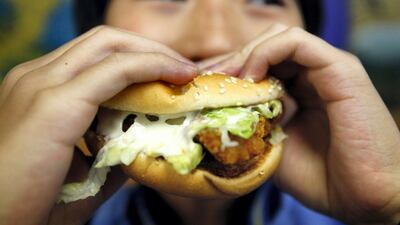Binge eating has soared in Dubai since the pandemic, with one clinic noting a 20 per cent increase in eating disorders.
According to psychologists at the Dubai Wellbeing Centre, people are using food to exert control over their lives in an uncertain time.
The situation is so acute that medics expect a surge in weight-loss surgery over the next few months.
It is a trend seen across the country during the coronavirus pandemic, with experts on Thursday – World Obesity Day – warning of the long-term impact to health from overeating.
Doctors in Abu Dhabi also said that since the outbreak of Covid-19 they had seen more teenagers who are obese, with low physical activity and the ease of ordering takeaway food major factors.
"Since the start of the pandemic, there has been a noticeable increase in concern among my patients about lack of physical activity and challenges with weight gain," said Nadia Brooker, from the Priory Wellbeing Centre in Dubai, who specialises in treating adults and young people with eating disorders.
“Eating disorders are serious, brain-based biological illnesses.
"While the pandemic has directly affected those with pre-existing eating disorders and caused a relapse in many, the increase in referrals over the past nine months has been primarily from people who were accessing support for eating disorders for the first time," Ms Brooker said.
"This highlights the extremes many – young and old – are going to in order to try to find ways to cope in these times."
In 2017, the UAE National Diabetes and Lifestyle Study of more than 3,000 expatriates found that 43 per cent were overweight. This suggested many in the UAE were vulnerable. A year later, a UAE national health survey showed the adult prevalence of obesity to be at 27.8 per cent and 17.35 per cent in children and adolescents respectively. As the pandemic took hold in 2020, the Priory Wellbeing Centre said the number of enquiries it received about treatment for eating disorders increased by one fifth.
Binge eating and anorexia were the most common causes of concern, with the former mainly among adults and the latter among adolescents.

“While we have no control over the pandemic, some may seek ‘control’ through other means, such as their diet,” said Ms Brooker, who advised clear meal plans to regain control of food intake.
“When people are planning a binge, it is usually done in secret and can be highly distressing.
“Binge eating goes hand in hand with a huge amount of shame, with people believing that others judge them as simply greedy and lacking in all self-control.
“The shame that everyone with an eating disorder feels often prevents them from accessing help.”
In a recent World Obesity Federation report, a detailed correlation was found between obesity and mortality rates as a consequence of the pandemic, placing it second as the most deadly risk factor behind age. The Covid-19 death rate is 10 times higher in nations where at least half the population is overweight.
With Australia and New Zealand, the Gulf region bucked the trend, despite a high percentage of their populations being overweight.
Figures show that about 60 per cent of the Gulf population is overweight, but reported deaths from Covid-19 in the region are relatively low at fewer than 10 per 100,000.
Doctors in the UAE said they were still trying to decipher why this was, but it could indicate a hidden problem that could take a generation to resolve.
Medics also expected demand to soar once the suspension of elective surgeries that temporarily sidelined bariatric and weight-loss procedures was lifted.
“Because of the pandemic we have performed far fewer bariatric surgeries than normal.” said Dr Basim Alkhafaji, who is general secretary of UAE bariatric surgery and an obesity surgeon at Canadian Specialist Hospital in Abu Hail, Dubai. “However, during this time the rates of obesity will for sure be going up as generally people are less active during the restrictions," he said.
“We are already getting many enquiries, so I expect there will be a lot of interest."
A representative from the Ministry of Health and Prevention said the UAE had taken great strides in the fight against obesity through its focus on treatment and awareness.


